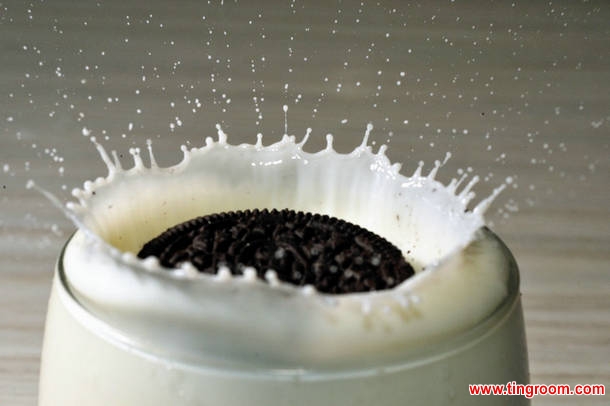英语听力文摘 English Digest 643 把牛奶从鼻孔吹出来
时间:2018-12-31 作者:英语课 分类:英语听力文摘 English Digest
英语课
Blowing Milk Out Of Your Nose
Remember back in grade school sitting at the lunch table when someone cracked a joke just after you took a swig of milk? As you laughed milk spurted 1 out your nose and sprayed everyone around you. Now that’s entertainment. But why does this happen?

图片1
Why?
Here’s how it works. In our head we have nasal passages, which allow air to go to our lungs, and an oral cavity, through which air also gets to the lungs, and food and drink get to the stomach.
These spaces are separated by the hard and soft palates, located on the top part of the mouth and throat. The hard palate has a bony plate and is near the front of the mouth. As the palate continues towards the back of the mouth muscle replaces bone, creating a softer area.
The Uvula
Hanging from the end of the soft palate is the uvula, the thing at the back of your throat that looks like a miniature punching bag. When we breathe with our mouths closed, air enters the nostrils 2 and passes over the soft palate and uvula on its way to the lungs. As this happens, the uvula hangs down.
But when we’re eating, drinking and swallowing, a reflex causes the soft palate and uvula to elevate and close off the nasal opening at the back of the throat so that what we’re swallowing doesn’t go up our nose.
Laughing causes us to exhale 3, which means that the soft palate and uvula drop into their breathing position. So if you laugh while drinking, the liquid shoots up into your unsealed nasal passage and out your nostrils.
把牛奶从鼻孔吹出来
你还能记得小学时候,当你坐在餐桌边刚喝了一大口牛奶时别人讲了一个笑话时的情况吗?当你被逗笑时,牛奶从你的鼻孔喷出、洒了你周围人一身。现在想想这确实是很好玩的。但是为什么会发生(牛奶喷出)的事情?
为什么会这样?
其中的原因是这样的。我们的头部有鼻腔以供空气通过直达肺部,而头部的口腔(食道)也可供空气通过进入肺部、并可供食物和液体通过进入胃部。
鼻道和食道是通过嘴和喉咙最里面的硬腭和软腭部分分开。硬腭在位于嘴前部的位置有一个骨板。这个硬腭一直延伸到嘴部肌肉的后端,这时骨板部分逐渐被软组织替代(即软腭)。
小舌
从软腭部分垂下来的即是小舌,这个器官在喉咙的后端,外形象一个小型的吊袋。当我们闭上嘴呼吸时,空气经过鼻孔、软腭和小舌直达肺部。在这种情况下,小舌处于下垂状态。
当我们进食、喝水或下咽食品时,生理反射作用促使软腭和小舌抬起以关闭喉咙里端的鼻腔,这样我们吞咽食物时食物就不会到达鼻腔里。
发笑使我们放松,这就意味着软腭和小舌回到呼吸时的位置。所以如果你在喝水时发笑,液体就会冲向没有关闭上的鼻腔,然后从鼻孔喷出。
(液体,火焰等)喷出,(使)涌出( spurt的过去式和过去分词 ); (短暂地)加速前进,冲刺
- Water spurted out of the hole. 水从小孔中喷出来。
- Their guns spurted fire. 他们的枪喷射出火焰。
鼻孔( nostril的名词复数 )
- Her nostrils flared with anger. 她气得两个鼻孔都鼓了起来。
- The horse dilated its nostrils. 马张大鼻孔。